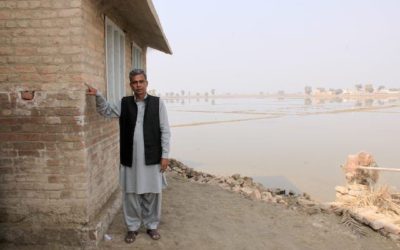Who gets to talk about climate-linked migration in the media?
Who gets to talk about climate-linked migration in the media?
Alex Randall
Alex is programme manager at the Climate and Migration Coalition.
Image: Jon S, Newspapers B&W (CC BY 2.0)
When journalists write about climate-linked migration, who do they turn to for information? Who do they interview, and who are their trusted sources?
These are vital questions as the people the media turn to are – in part – the people who get to define the debate about climate-linked migration.
Crucially it is these sources of information and comment that are shaping the debate about climate-linked migration amongst the wider public. This is the subject of new research published by us this week as part of the Research Handbook on Climate Change, Migration and the Law.

Online Q&A: Covid-19, climate change and migration: 14th May at 3pm BST
Online Q&A session14th May at 3pm BST14th May at 3pm BSTHow does a city in lockdown deal with a sudden climate-driven disaster like a typhoon? The measures needed to cope with a sudden episode of displacement - such as mass emergency shelters - are exactly the...
Dominant media sources on climate-linked migration
Our contribution to the book looks for the first time at the question of media actors in the debate about climate-linked migration. Our research involved an exhaustive review of UK print media coverage of climate-linked migration stretching over 10 years. Hundreds of news articles were analysed and ‘coded’ to identify the different institutions and people that journalists have turned to for comment and information. Our analysis enables us to look at the dominant sources – and from that the dominant narratives and framings of climate-linked migration that exist in the UK media.
The dominant sources of information and comment have gravitated to a small number of key events. The most prominent were New Zealand’s “climate refugee” court cases. During these cases a number of individuals attempted to gain refugee status in New Zealand, arguing that climate change impacts on the island state of Tuvalu made their return impossible. Sources associated with this case including Ioane Teitiota – the claimant – his lawyer and representatives of the tribunal court dominated UK media coverage.
Online Q&A: Covid-19, climate change and migration: 14th May at 3pm BST
Online Q&A session14th May at 3pm BST14th May at 3pm BSTHow does a city in lockdown deal with a sudden climate-driven disaster like a typhoon? The measures needed to cope with a sudden episode of displacement - such as mass emergency shelters - are exactly the...
Key resource
Climate, migration, neoliberalism
The lecture sketches out a history of neoliberalism, and then looks at how the culmination of this political thinking is reflected in the policies that are being created to address climate change and migration.
From sources to narratives
Other high ranking sources were US government representatives. These were either in reference to planned relocations of indigenous people within the Arctic. Or to then secretary of State John Kerry’s comments about the links between climate change and the conflict in Syria.
This means that media coverage centred around a small number of geographic locations – the Pacific, the Arctic and Syria. The coverage of Syria tends to paint climate-linked migration as a security issue. Migrants and refugees fleeing Syria were represented in this coverage as being a threat to European security and even a driver of conflict and terrorism.
There is some evidence linking the start of the Syrian crisis to climate change – however there is little evidence linking the movement of people to wider security problems.
Migrants and refugees in the Pacific were characterised by the media very differently. Rather than being a security risk, Pacific people were described almost exclusively as victims. Narratives around Pacific island migration tended to see Pacific migrants as people forced to abandon ancestral homes and seek refuge in unfamiliar places.
While this is often the case, there are also many migrants from the Pacific who migrate on legal working and education visas and do not see themselves as victims or refugees.
What our analysis of media actors reveals is a lack of diversity in how climate-linked migration is represented in the UK media. Our analysis reveals a focus on a small number of geographic locations – when in fact this is truly a global issue.
Key resource
Online Q&A: Covid-19, climate change and migration: 14th May at 3pm BST
Online Q&A session14th May at 3pm BST14th May at 3pm BSTHow does a city in lockdown deal with a sudden climate-driven disaster like a typhoon? The measures needed to cope with a sudden episode of displacement - such as mass emergency shelters - are exactly the...
Related video
Climate, migration, neoliberalism
The lecture sketches out a history of neoliberalism, and then looks at how the culmination of this political thinking is reflected in the policies that are being created to address climate change and migration.
A dilemma for climate change sceptics
Interestingly there was an almost total absence of climate sceptic sources in coverage about climate-linked migration – even within the usually climate sceptic media outlets such as Daily Mail and Daily Express.
The issue of climate-linked migration presents these newspapers with a dilemma.
On one hand climate-linked migration can be twisted into a new immigration scare story. The right of centre press generally reported on climate-linked migration fitting it into their existing narratives about refugees and immigration. But in order for these stories to make sense they had to present a view of climate change science that accorded with the scientific consensus, rather than their usual sceptical position.
If they had presented climate science as contested, then it would have made no sense to then claim that climate change would create a new immigration crisis. This means that sceptical sources are almost entirely absent from the coverage of climate-linked migration.
Research Handbook on Climate Change, Migration and the Law. Edited by Benoît Mayer, Chinese University of Hong Kong and François Crépeau, McGill University, Canada. Published by Edward Elgar Publishing.
Related video
Climate, migration, neoliberalism
The lecture sketches out a history of neoliberalism, and then looks at how the culmination of this political thinking is reflected in the policies that are being created to address climate change and migration.
Climate, migration, neoliberalism
The lecture sketches out a history of neoliberalism, and then looks at how the culmination of this political thinking is reflected in the policies that are being created to address climate change and migration.
Climate change and migration: predictions, politics and policy
Get to grips with one of the defining issues of the 21st Century – how will climate change re-shape migration across the world. Join a free, 100% online course to investigate this essential topic
Event: Migration and displacement at the climate talks
How are migration and displacement being dealt with at the international climate change talks? Find out more with our online event
Event: Climate change and Migration 101. 4 December
Get to grips with the links between climate and the movement of people
Event: hot wars- Climate change, armed conflict and security. 15 November
What do we know about the links between climate change and conflict? Will life on a hotter planet be on with more armed violence?
Briefing: climate change and migration. 24 October, London
An evening briefing exploring the links between climate change and migration. Find out more and book places. 24 October, London
Workshop on climate change and migration. 16 October, London
Workshop on climate change and migration. A half-day session exploring the links between climate change and migration. 16 October, London






